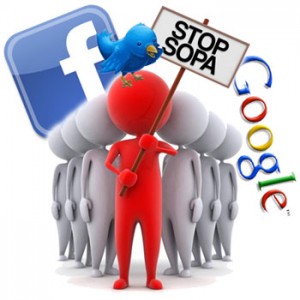The U.S. Congress began debating a bill to control access to certain web pages. The project, called SOPA (“Stop Online Piracy Act”: stop online piracy), sought to ban certain pages to be visible after a search on Google, and a visit from a server hosted in the United States.
According to the draft law, copyright holders will be able to lodge complaints against some online sites that are used to share content, to clear their DNS. This means that the address is not found: http://www write even if you follow the exact name, your access provider (ISP) could never view the page in question. Even using a change of IP (a trick used to navigate in countries where the government controls and censors the Internet, such as China, for example), you can not access blocked information.
This is problematic on several levels. Initially, there is the creation of one precede which goes against the basic idea of the Internet: the ability to connect two computers together in order to exchange information. The absurd idea that according to which it is illegal to make a copy of contents that we bought; in other words, that to borrow a movie to a friend to look at it without making money above represents a redefinition of our relationship with our cultural products. Because, according to the new SOPA law, your ISP would have to monitor all your connections so as to highlight sending content subject to copyright. That is to say, you send a song by email to a friend for her birthday? This would be illegal (if the song pays copyright, of course) and expose you to reprisals.
So, on the one hand, you would not find any more sites for watching online series, because the DNS blocked; and the other, you would be subjected, permanently, with the control of your exchanges, even private, with your contacts and friends.
In this way, what is threatened here is the freedom to connect with whom we want to, who we want, when we want, using the virtual network. In other words, the founding idea of the Internet would be subject to government control. Risks of political censorship and the loss of individual freedom on the web has never been more relevant.
Fortunately, the White House and Barack Obama just put their veto on this legislation. But do not be fooled: the struggle for control of the Internet will mark the coming years. Hidden under the claims of the “copyright” interpreted in the most egoistic possible way (do not share content that was purchased with his friends), we risk losing our freedom on the web and the creation of organizations intended to supervise us permanently.
These are contemporary issues that our generation will face.
